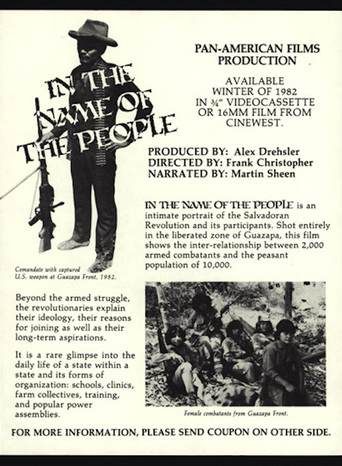Rodrigo Amaro
This compelling documentary is a testimony of the brave and unfair conflict between small guerrilla groups against the military forces run by El Salvador's government, supported by U.S. machinery and budget. Once again the ideology of a powerful nation helping a nation to exterminate Communism (here seen as a revolutionary group that could run the country) in the Cold War context to protect their own interests but a ridiculous act since the victims are peasants, women and children who just want to live in better conditions instead of dying of hunger. The guerrilla is formed by those victims and plenty of children carrying on improvised weapons, trying their best with the very few they have in order to fight for a more just and democratic society for their people.Director Frank Christopher along with a small group of filmmakers smuggled through the country, at the time on an on-going civil war and followed the militants battles and daily routine, training, hearing their tragic stories. It's fascinating to see that even though most of their army consisted of mostly illiterate individuals the group leaders found time to educate them, teach them how to read and how to understand the political situation they were involved. The movie worked as a way to give voice and faces to FMLN's cause that up until the time was voiceless and faceless, with many individuals being killed, brutalized and ignored by the world. Nothing substantial and favorable happened with the movie's release. It may have been reason for debate in small circles and even may have gathered a good audience with the Oscar nomination but the conflicts and death squads went on until 1992. But we have the dimension and the importance this had in El Salvador's population. Watching this it made me think that Hollywood and even Latin cinema is missing out an important theme that can be transformed into a great movie. It has plenty of material to compose a true to life picture or even fantasize a bit for an adventure/thriller project. There's stories to be told. But perhaps I'm seeing this because there were parts in which things seemed fictitious just as much as Werner Herzog's "Ballad of the Little Soldier", similar concept but filmed with the rebels in Nicaragua. But on the other hand, even if some moments were "created", it was more effective than any film I've seen. The improvised wedding ceremony is a scene that I will never forget. It was tragically beautiful. Like Herzog's fore-mentioned film and "The Panama Deception" (someone should put those together and release a DVD, Blu-ray trilogy), it's not an easy watch and it's not supposed to be. It's more about lost battles than spectacular victories against a more powerful enemy. But there's hope, love and fearless acts. Martin Sheen proves to be a reliable and good narrator but erratic whenever he says something about "the guerrillas" and ends up sounding like he said "the gorillas". Great documentary nonetheless. 9/10

